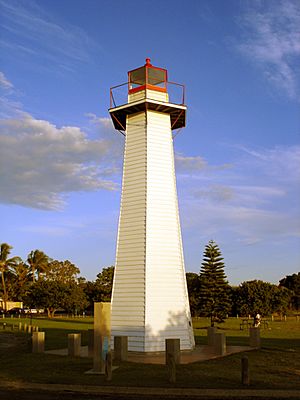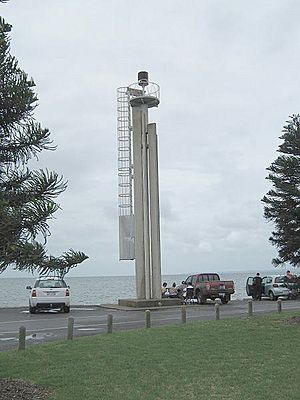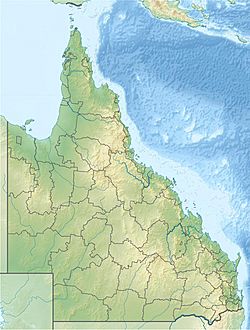Cleveland Point Light facts for kids
 |
|
| The old Cleveland Point Light, 2006 | |
|
|
|
| Location | Cleveland Queensland Australia |
|---|---|
| Coordinates | 27°30′37″S 153°17′21″E / 27.51020°S 153.28908°E |
| Year first constructed | 1864-1865 |
| Year first lit | 1865 |
| Deactivated | 1976 |
| Construction | timber frame clad with weatherboards |
| Tower shape | tapered hexagonal tower with gallery and lantern |
| Markings / pattern | white tower, red lantern |
| Height | 38 feet (12 m) |
| ARLHS number | AUS-257 |
The Cleveland Point Light, also called the Point Cleveland Light, is a lighthouse in Cleveland, Australia. It stands on the north-eastern tip of Cleveland Point. From here, it looks out over Moreton Bay and Raby Bay.
The original lighthouse was built between 1864 and 1865. It was made of wood and shaped like a hexagon. This design is quite rare! Only one other lighthouse like it still exists in Australia.
In 1976, a new lighthouse made of concrete took its place. The old wooden lighthouse was then moved a short distance away. It still stands there today. The newer concrete light was removed in 2009.
The first light on this spot was a private beacon in 1847. Then, a temporary government light was set up in 1864. The permanent wooden tower was finished in 1865. Its light source was updated in 1874 and again in 1879. In 1934, the lighthouse started using electricity. It kept working until 1976 when it was turned off. The old tower was moved in 1979 and fixed up in 1987.
The old lighthouse is special because of its hexagonal shape. It's also unique because it's covered with weatherboards. This is different from the usual metal covering. The top part, called the lantern room, is painted red. Both the old and new lighthouses were easy to reach. You can visit the old tower today, but you can't go inside.
Contents
The Original Lighthouse: A Look Back
How the Lighthouse Began
The very first navigation aid at Cleveland Point was a beacon. It was put there in 1847 by Francis Edward Bigge. He was trying to make Cleveland a main port for Moreton Bay.
In the mid-1800s, small steamboats were important for farmers. They used them to travel around Moreton Bay. This area was known for its rocks and shifting sandbanks. So, many lights were built to help boats navigate safely. Sometimes, locals even put up their own lights, like at Cleveland Point.
In the 1860s, the Queensland Government decided to build a permanent light. A temporary government light was first used in April 1864. The permanent wooden lighthouse was built soon after, in 1864-1865.
The first light in the permanent tower used kerosene. It could be seen for about 14.5 kilometres (7.8 nmi). In 1874, a better lens from another lighthouse was installed. Then, in 1879, an even more powerful lens was added. In 1920, two red sections were added to the light. These warned boats about nearby shallow areas.
In 1934, the lighthouse switched to electricity. The City Electric Light Company Limited then took care of it. The light came from a special filament lamp.
In 1969, the lighthouse was part of an experiment. Scientists tested using laser beams to help with navigation. In 1976, the lighthouse was turned off. A new concrete light was built only 3 metres (9.8 ft) away. The old lighthouse was moved about 30 metres (98 ft) away in March 1976. The Redland Shire Council fixed it up in 1987.
Famous Lighthouse Keepers
The first person to look after the lighthouse was Alfred Winship. He worked there from 1864 to 1877.
The second keeper was James Troy. He and his family lived and worked there for 50 years! This was from 1877 until 1927. He was the longest-serving lighthouse keeper at one lighthouse in Australia. After him, Jim Klemm was the keeper from 1927 to 1951. Other keepers worked there for shorter times after that.
What the Old Lighthouse Looks Like
The old lighthouse is painted white and gets narrower towards the top. It's built with a timber frame, which was common for lighthouses in Queensland back then. But it's special because it's hexagonal, not round like most lighthouses. It's also covered with weatherboards, not metal. The only other lighthouse like it that still exists is the Old Burnett Heads Light.
Inside, the tower is not painted. It has three levels, and you climb between them using a ladder. There's a wooden floor on the first level. Two windows are on the eastern side, one on the first level and one on the second.
On top of the tower is a red lantern room. It's made of iron and has an iron dome roof. It has six panels, five clear and one red. A small opening under the window on the western side leads to the gallery. The gallery is a wooden balcony around the top. It's also hexagonal and has a pipe handrail.
 |
|
| The newer Cleveland Point Light, 2009 | |
| Location | Cleveland Queensland Australia |
|---|---|
| Coordinates | 27°30′34″S 153°17′20″E / 27.5095°S 153.2890°E |
| Year first constructed | 1976 |
| Deactivated | 2009 |
| Foundation | concrete base |
| Construction | concrete tower |
| Tower shape | post and two supporting vertical bars with balcony |
| Markings / pattern | unpainted tower |
| Height | 39 feet (12 m) |
| Focal height | 46 feet (14 m) |
| Range | white: 13 nmi (24 km; 15 mi) red: 13 nmi (24 km; 15 mi) |
| Characteristic | Fl WR 3s. |
| Admiralty number | K2898 |
| NGA number | 111-5812 |
| ARLHS number | AUS-130 |
The Newer Concrete Lighthouse
The new lighthouse was built in 1976. It was an unpainted concrete post. It had a metal balcony and was supported by two concrete bars. This new lighthouse was built exactly where the original one used to stand.
In 2009, this concrete lighthouse was taken apart. This was done to make space for a large prop boat. The boat was used for filming the 2010 movie The Chronicles of Narnia: The Voyage of the Dawn Treader. In 2010, it was suggested that the lighthouse should be put back together. The idea was for the Redland City Council to own it as a tourist attraction. It would no longer be used for guiding ships.
How the Newer Light Flashed
The newer lighthouse had a special light characteristic. It would flash every three seconds. The flashes were either red or white, depending on the direction. White flashes could be seen for 13 nautical miles (24 km; 15 mi). These were shown in certain directions. Red flashes could be seen for 8 nautical miles (15 km; 9.2 mi). These were shown in other directions to warn boats.
Visiting the Lighthouse Site
The area where the old lighthouse stands is managed by the Redland City Council. You can visit the site, but you cannot go inside the lighthouse itself. The original lens from 1879 is on display. You can see it at the Redland Shire Council chambers in Cleveland.
 | Anna J. Cooper |
 | Mary McLeod Bethune |
 | Lillie Mae Bradford |


